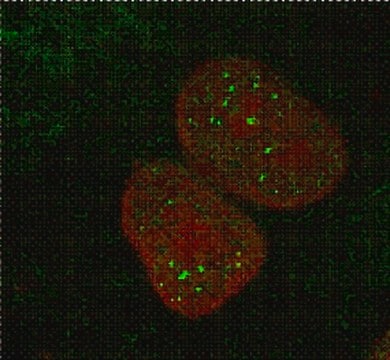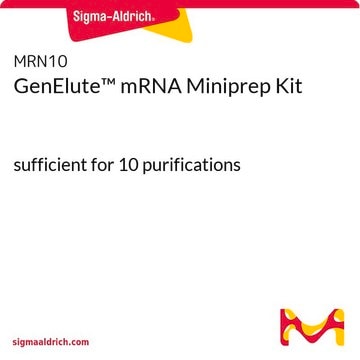RTN70
GenElute™ Mammalian Total RNA Miniprep Kit
sufficient for 70 purifications
Synonym(s):
GenElute™ Mammalian RNA Kit, animal total RNA purification kit, cell RNA extraction kit, cell RNA isolation kit, cell total RNA purification kit, tissue total RNA purification kit, total RNA extraction kit, total RNA isolation kit, total RNA purification kit, Gen Elute
About This Item
Recommended Products
usage
sufficient for 70 purifications
Quality Level
greener alternative product characteristics
Designing Safer Chemicals
Learn more about the Principles of Green Chemistry.
sustainability
Greener Alternative Product
technique(s)
RNA purification: suitable
greener alternative category
storage temp.
15-25°C
Looking for similar products? Visit Product Comparison Guide
Related Categories
General description
denaturation of macromolecules and inactivation of RNases. Addition of ethanol causes RNA to bind when the lysate is spun through a silica membrane in a microcentrifuge tube. After washing to remove contaminants, RNA is eluted in 50-100 μL of Elution Solution. Up to 150 μg of total RNA can be isolated in less than 30 minutes.
If all traces of DNA contamination must be eliminated, further treatment with DNase I is recommended. DNase I digestion can be performed while the RNA is bound to the GenElute Binding Column using the On-Column DNase I Digestion Set (DNASE10 and DNASE70). Alternatively, for more stringent removal of contaminating DNA, the final RNA preparation can be treated with Amplification Grade DNase I (AMPD1).
Application
- from snap-frozen preoptic area of rat brain
- from central part of the mantle tissue containing gonads of Mytilus trossulus mussel
- from murine liver
Features and Benefits
- Purifies total RNA from up to 107 cells or 40 mg of tissue per prep
- Yields up to 150 μg of pure, concentrated total RNA per prep
- Recover RNA from as few as 100 cells
- Simple and efficient–12 to 18 preps in 30 minutes
- Faster than gravity flow anion exchange methods
- No cumbersome steps associated with resins and magnetic slurries
- 40% more purifications per kit than the leading supplier
Other Notes
Principle
Legal Information
related product
Signal Word
Danger
Hazard Statements
Precautionary Statements
Hazard Classifications
Acute Tox. 2 Dermal - Acute Tox. 3 Inhalation - Acute Tox. 3 Oral - Aquatic Acute 1 - Aquatic Chronic 2 - Eye Dam. 1 - Repr. 2 - Skin Corr. 1C - Skin Sens. 1 - STOT RE 2 Oral
Target Organs
Liver,Heart
Supplementary Hazards
Storage Class Code
6.1A - Combustible acute toxic Cat. 1 and 2 / very toxic hazardous materials
Certificates of Analysis (COA)
Search for Certificates of Analysis (COA) by entering the products Lot/Batch Number. Lot and Batch Numbers can be found on a product’s label following the words ‘Lot’ or ‘Batch’.
Already Own This Product?
Find documentation for the products that you have recently purchased in the Document Library.
Customers Also Viewed
Our team of scientists has experience in all areas of research including Life Science, Material Science, Chemical Synthesis, Chromatography, Analytical and many others.
Contact Technical Service











